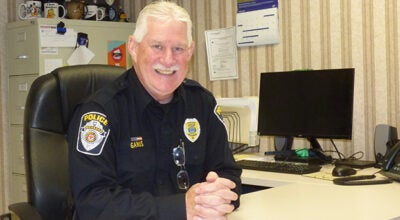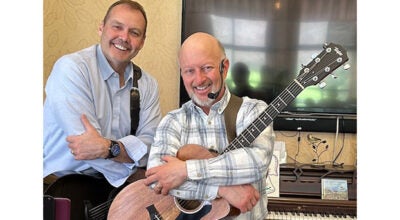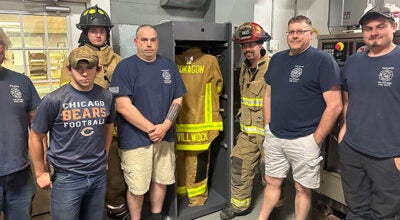IUSB sustainability center director speaks at DUHS
Published 9:20 am Wednesday, November 18, 2009

IUSB sustainability center director Mike Keen spoke at DUHS on Tuesday.
By JOHN EBY
Dowagiac Daily News
When Mike Keen became director of the Indiana University South Bend (IUSB) Center for a Sustainable Future a year and a half ago in August 2008, he wasn’t quite sure how he would fill four hours a day the half-time position represented.
“Now it takes all my time,” he said in Dowagiac Tuesday, “and I sit there trying to figure out how I meet all the obligations. The demand and interest out there are just incredible. Every time I make a presentation, we get two or three more invitations.”
As an academic unit with 17 faculty, the Center for a Sustainable Future has responsibility for teaching and learning, research and creative activity and service, as opposed to a unit focused on operations and facilities.
“A lot of sustainability offices or centers focus on operations and facilities,” he said Nov. 17 after speaking to Union HIgh School students of Dan and Jodie Vandenheede.
“The University of Notre Dame has an office of sustainability that we work with, but they are on the operations and facilities side. They consult with the academic side. We’re on the academic side. We consult with operations and facilities.
“My job is to help develop new curriculum and courses. We’ve created a new minor that will start to be taught next fall. Then we hope to eventually develop a major, graduate certificate and degrees. We’re also working with our continuing education people to develop some sustainability training for non-degree folks.”
In terms of research, “We’re trying to help our faculty members develop research projects in these kinds of areas related to sustainability. The problem we’ve got at the university is that sustainability is such a new field. There are only three programs that offer Ph.D.s right now. I’m not even sure the first one at the University of Arizona has graduated its first.”
“We’re like information technology people were 20 years ago,” Keen said.
“We’re all self-taught. We need people who went through and made their careers on this stuff, but that’s the next generation. Our center tries to encourage existing faculty members to incorporate some of these ideas into their research where it makes sense.”
Then, in terms of service, Keen said, “Not only to our campus, to make it more sustainable, but to go out and educate the community with presentations to classes like this. We did a workshop two weeks ago where we had 120 people from local business, government and not-for-profit organizations in the Michiana area.
“We want to begin to help them understand how they can use these basic principles of sustainability as a platform for innovation and prosperity to not only make ourselves more economically friendly as a region, but also to create the kind of innovative businesses that will help us take advantage of the emerging new green economy.”
As a sociologist, Keen’s area of research expertise was the history of sociology in the United States and eastern Europe.
“I took a look at how the FBI did surveillance of American sociologists,” he said, “and I also looked at how the (Soviet) KGB was surveilling eastern-central European sociologists.”
As for how he got from there to the center, factor in the fall of the Berlin Wall 20 years ago.
“I started at Notre Dame teaching the nuclear dilemma, a class about the threat of nuclear war Father Hesburgh created that was one of the first in the country. As a graduate student, I was asked to be an assistant in that class. I took that class when I went to IUSB and recreated it. Two years after that, the wall came down, so all of a sudden I’m talking about the threat of nuclear war when everybody’s saying, ‘The Cold War’s over.’
“But in one segment of that class I talked about the environmental threat (posed by) the nuclear weapons industry as well as nuclear winter. I began to see that the whole nuclear issue was part of a greater issue, the threat of our relationship between environment and society, which I taught until the late ’90s. In the late ’90s I began to see that it wasn’t just environment and society, it was environment, economy and society.”
What is now the center originated with a reading group and a campus theme year.
An inherent problem with university structure is that “we’re all in these disciplinary silos” segregated into economists, sociologists, educators and business people.
“We don’t talk to each other. We’re so specialized we hardly talk to ourselves,” Keen said. “Yet (sustainability) is totally interdisciplinary. It couldn’t be put in a department or even in a single school, so we created a center that allows us to take faculty from all over the university.”
Universities also tend not to recognize civic engagement as readily as publishing research.
“We can publish an article in a peer-reviewed journal,” he said, “that might be read by 50 or 60 other people around the world and get promotions and raises on that basis. But an article in a local newspaper read by thousands of people that might change a behavior doesn’t count as ‘academic.’ We need a place where we can be both interdisciplinary and engaged in civic outreach without threatening your career at the university. The center provides us with the institutional space to allow that to happen.”
Long-term, “We need to treat public engagement with the same respect we treat academic work,” Keen said.
Keen, 51, grew up in Tiffin Ohio, where he attended Heidelberg College.
He drives a 25-mph electric car which costs a penny for juice for every 12 cents spent on gas and periodically bikes 3 1/2 miles to work.






